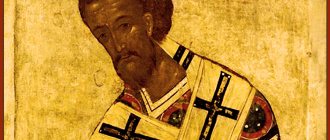Saint Nicholas, Archbishop of Myra
Troparion, tone 4:
Show the rule of faith and the image of meekness and self-control to your flock, even the truth of things; For this reason, you have gained high humility, rich in poverty, Father Hierarch Nicholas, pray to Christ God to save our souls.
Kontakion, voice 3:
In Mireh, the holy one, you appeared as a priest: For Christ, O Reverend, having fulfilled the Gospel, you laid down your soul for your people, and saved the innocent from death; For this reason you have been sanctified, as the great hidden place of God’s grace.
Magnification:
We magnify you, Father Nicholas, and honor your holy memory, for you pray for us to Christ our God.
Prayer:
Oh, all-validated and all-honorable bishop, great miracle worker, saint of Christ, Father Nicholas, man of God and faithful servant, man of desires, chosen vessel, strong pillar of the church, bright lamp, star shining and illuminating the whole universe: you are a righteous man, like a blossoming phoenix , planted in the courts of your Lord, living in Mireh, you were fragrant with the world and the ever-flowing myrrh exuded the grace of God.
By your procession, holy father, the sea was sanctified, when your many-wonderful relics marched to the city of Barsky, from east to west to praise the name of the Lord. Oh, wonderful and wondrous miracle worker, quick helper, warm intercessor, kind shepherd, saving the verbal flock from all troubles! We glorify and magnify you, as the hope of all Christians, the source of miracles, the protector of the faithful, the wise teacher, the hungry feeder, the weeping joy, the naked, the sick doctor, the sea-floating steward, the liberator of captives, the widows and orphans, the nourisher and protector, the guardian of chastity, infants a meek chastiser, the old strengthened, fasting a mentor, the toilers restful, the poor and wretched abundantly rich. Hear us praying to you and running under your roof, show your intercession for us to the Most High and intercede with your God-pleasing prayers everything useful for the salvation of our souls and bodies: preserve this holy monastery ( or this temple
), every city and the whole, and every country Christian, and people living from all bitterness with your help, we know, we know how much the prayer of the righteous can do, hastening for good: for you, the righteous, according to the Most Blessed Virgin Mary, intercessor to the All-Merciful God of the Imams, and to yours, most kind father, warm intercession and we humbly flow to intercession. You protect us, like a cheerful and warm shepherd, from all enemies, destruction, cowardice, hail, famine, flood, fire, sword, invasion of foreigners, and in all our troubles and sorrows, give us a helping hand, and open the doors of God’s mercy: tenderly We are unworthy to behold the heights of heaven, from the multitude of our iniquities, bound by sinful bonds, and neither the will of our Creator nor the will of our creator, nor the preservation of His commandments. At the same time, we bow our contrite and humble hearts to our Creator, and we ask for your fatherly intercession to Him: help us, servant of God, so that we do not perish with our iniquities, deliver us from all evil and from all things that are resistant, guide our minds and strengthen our hearts ours in the right faith, in which through your intercession and intercession, we will not be belittled by wounds, nor rebuke, nor by pestilence, nor by any wrath from our Creator, but let us live a peaceful life here and may we be worthy to see good on the land of the living, glorifying the Father and the Son and the Holy Spirit, One in the Trinity, glorified and worshiped God, now and ever and unto ages of ages. Amen.
Image of meekness
The easiest thing is to become irreconcilable enemies, the easiest thing is to quarrel. Doctor of Philosophy, Professor, Honored Scientist of Russia Konstantin Mikhailovich Dolgov discusses the virtues of meekness and patience in modern politics, diplomacy, culture, literature, public and personal life.
Patience and a little effort
In modern society, the virtues of meekness and patience have somehow been forgotten: they seem to not exist or are ignored. And this is amazing! And in Russia, as you know, for many centuries people have paid special attention to these qualities, which Jesus Christ speaks about in the Sermon on the Mount, throughout the Gospel, and then His disciples, including the supreme apostles Peter and Paul. According to the Savior, meek, modest, merciful, peace-loving people are blessed, the Kingdom of Heaven belongs to them, they will “inherit the earth.” And further:
“You have heard that it was said: an eye for an eye and a tooth for a tooth (Ex. 21:24). But I say to you: do not resist evil. But whoever strikes you on your right cheek, turn the other also to him; and whoever wants to sue you and take your shirt, give him your outer clothing too; and whoever forces you to go one mile with him, go with him two miles. Give to the one who asks from you, and do not turn away from the one who wants to borrow from you.
M.V. Nesterov. Sketch of a painting for the Cathedral of St. Vladimir in Kyiv. 1892
You have heard that it was said: love your neighbor and hate your enemy (Lev. 19:18). But I say to you: love your enemies, bless those who curse you, do good to those who hate you, and pray for those who use you and persecute you, so that you may be sons of the Father. your Heavenly..." (Matthew 5:38-45).
The Savior sharply condemns the passion of anger, calls for patience, forgiveness, peace: “...Everyone who is angry with his brother in vain is subject to judgment; whoever says to his brother: “raka” (empty man) is subject to the Sanhedrin (supreme court); and whoever says, “You fool,” is subject to fiery hell. So, if you bring your gift to the altar and there you remember that your brother has something against you, leave your gift there before the altar, and go first and be reconciled with your brother, and then come and offer your gift. Make peace with your adversary quickly, while you are still on the road with him...” (Matthew 5:22-25).
It is no coincidence that a proverb, popular wisdom, appeared: “Christ endured and commanded us.” Or another: “Patience and labor will grind everything down,” that is, they will overcome everything.
Now everyone is busy with politics, the situation is very alarming, many are preparing for war, especially the United States as the most aggressive power that is trying to subjugate the whole world. The United States has deployed military bases in many states bordering Russia. But many Americans consider themselves believers - including congressmen, representatives of the presidential administration, the military-industrial complex, financiers, business people, those involved in economics, industry, etc.
M.V. Vasnetsov. Venerable Sergius of Radonezh
But why is such intolerance evident in US foreign policy today? Is Russia named enemy number one? It was understandable when the Americans declared their enemy a socialist state - the Soviet Union with its ideology of communism, antagonistic to capitalism and imperialism. But the Soviet Union has long ceased to exist. Russia has become the same capitalist country as America, France, Great Britain, Germany, etc. What's the matter? On what basis did intolerance and Russophobia arise?
And the whole point is elementary hypocrisy: when they try to blame not themselves, but others - Russia, China, Iran and other countries - for their inability to solve internal political, economic and social problems.
The Sermon on the Mount of Jesus Christ says it all: “Judge not, lest ye be judged, for with the judgment ye judge, ye shall be judged; and with the measure you use, it will be measured to you. And why do you look at the speck that is in your brother’s eye, but do not notice the plank that is in your own eye?” (Matthew 7:1-3).
For many years I taught at the Diplomatic Academy of the Russian Foreign Ministry, headed the department of philosophy, politics and culture, taught relevant courses, including a special course on world religions and world culture, and I can say that diplomacy is based, essentially, on the meekness and modesty of any people or power , countries, in each of which you can always find both advantages and weaknesses.
Stills from the film "War and Peace". Sergei Bondarchuk as Pierre, Antonina Shuranova as Marya Bolkonskaya and Vyacheslav Tikhonov as Prince Andrei
And if they point out some shortcomings to you, then you need to pay attention to this, try to overcome them, come to an agreement with your partners, opponents and even adversaries. At the same time, negotiations should be friendly, not hostile. You cannot conduct a dialogue by approaching your partner as an enemy. On the contrary, it is necessary to consider him as a co-worker, colleague, country or people with whom it is necessary to have good relations. But for this you really need to possess the virtues of meekness, modesty, and be able to see shortcomings in yourself, and then in your partners or opponents. And then, through common efforts, we will gradually get rid of what sets one people against another, what prevents them from getting closer, making friends; it is necessary to carry out some serious measures together in the field of politics, and in the field of economics, culture, etc.
The virtue of meekness has universal significance, as does the virtue of patience. Why? Some problems can be overcome quickly and successfully, while others take years, decades, if not centuries to solve, which means you need to be patient.
Meekness, patience, and the ability to compromise have saved peoples and the entire world from disasters many times. Let's look back at some of history's greatest moments, such as the Cuban Missile Crisis of 1962, when the United States and the Soviet Union stood on the brink of World War III. The slightest carelessness could lead to irreversible consequences. Nevertheless, the leaders of the two countries - J. Kennedy and N.S. Khrushchev - were able to come to an agreement at the most critical moment, the crisis was safely resolved.
The easiest thing is to become irreconcilable enemies, the easiest thing is to quarrel. Real diplomacy and politics presuppose serious, sometimes quite lengthy and painful negotiations, consultations in the most acute, crisis moments of relations. Only in this peaceful way can complex, sometimes seemingly insoluble, problems be resolved.
Virgo. M.V. Nesterov. Sketch of a painting for St. Vladimir's Cathedral in Kyiv
A striking example of this is the conclusion of a peace agreement between Armenia and Azerbaijan, which was reached in November 2022 with the active mediation of Russia. It is clear that we still have to agree on a whole range of issues, which will take a lot of time, but the main thing is that the long-awaited peace has arrived, the terrible bloodshed has stopped.
I have been to Armenia and Azerbaijan many times. Karabakh is simply an amazing place, with which even Switzerland cannot be compared - it is so beautiful there, beautiful at any time of the year. I remember in Soviet times I was in the Union of Composers of Armenia, whose representative office was located in Nagorno-Karabakh. Azerbaijanis lived nearby. Everything is quiet, peaceful, normal, no military action was expected. Although, I think that there have always been problems, are and will be, but the main thing is to skillfully resolve them, and not lead to an armed conflict.
Meekness is the opposite of anger and malice. This is not love, of course, but still a friendly attitude towards another person or people. Let's ask ourselves: why, of the Slavic peoples, only the Russian people managed to create a great state a thousand years ago? Despite all the historical vicissitudes, the state - huge, powerful, strong, capable of repelling anyone - exists. But there were moments when everything literally hung by a thread: one can recall the invasion of the Teutonic Knights, the Tatar-Mongol yoke, Napoleon’s campaign, the First and Second World Wars, the collapse of the Soviet Union, etc. What is the reason for our resilience and survival in the most difficult circumstances? But the fact is that our state has never sought to enslave other peoples and countries; on the contrary, it has always tried to establish good and equal relations with other peoples. Currently, Russia constantly offers the same thing: the establishment of mutually beneficial, equal, good relations with all countries.
The Sermon on the Mount says: the meek will inherit the earth. It is not those who rattle weapons who threaten to destroy everyone, but the peaceful, patient ones. Because anger, bitterness towards other people and nations is a boomerang that returns and destroys those who launched it.
Americans today present their government system as the most democratic and perfect. But this system has long since degenerated and has become essentially anti-human; many simply call it fascist and racist. Moreover, anger and hatred towards other peoples returns to its original source. Many today fear that protest movements in the United States could develop into a civil war, because a person or society, a state that is intolerant of others, carries evil, pours out its anger on others, eventually gets it all back. Everything turns against the bearers of these passions and turns out - literally - inside this person, society or state. Using the example of the United States, we see this very well, and before that, similar historical processes took place in Germany and other countries.
The US elite has traditionally considered and considers itself the superior race. But on what basis? Indians, Chinese, and Arabs have an ancient, millennia-old culture, just like Russia. On what basis do Americans, who called themselves cowboys, consider themselves superior to everyone else and at the same time cultivate the hatred of one people towards another?
In all spheres of activity, one should always pursue a policy that would bring peoples together, establish relations of respect and friendship, equality and justice between them, so that they can help each other, and not quarrel and not destroy each other.
In order to successfully develop these relationships, one must have modesty, humility and patience, regardless of whether the people are large or small, because all of this is the human race, God's people.
Meekness, patience, and other virtues are what manifest themselves in man as the image of God, the likeness of God; these qualities carry within themselves Divine thoughts and feelings, Divine truth.
Now there is a rapid digitalization of the global world. Political, social, and economic life requires young people to have a good knowledge of modern digital technologies and mastery of computer equipment. Nevertheless, parents, people of the older generation, and especially the young should not forget that without human contacts, direct communication between person and person, teacher with student, older and younger generations, and finally, prayerful communication between a person and God, it is impossible to live. If this is lost, the person begins to dehumanize.
Unfortunately, lately we have seen that society is gradually reaching the point of devaluing personality, individuality, and human life in general. But the life of every person - literate, illiterate, highly cultured, great, simple - is unique and given by God. And it must be appreciated regardless of what position a person occupies in society, not to mention the notorious material wealth or poverty, which have nothing to do with the human personality at all. And wealth is very often detrimental, because it is said: “Do not lay up for yourselves treasures on earth, where moth and rust destroy and where thieves break in and steal, but lay up for yourselves treasures in heaven, where neither moth nor rust destroys, and where thieves do not break in or steal, for where your treasure is, there your heart will be also” (Matthew 6:19–22).
If I were asked what the main difference between a woman and the “strong half”, that is, from a man, is, one could say that a woman is gentler, more vulnerable, more beautiful, she is more faithful, selfless - one could list various virtues for a long time. But perhaps the main distinguishing qualities of a woman are the greatest patience and boundless love. How much patience do you need to have to carry a fetus, an unborn child, for nine months in your womb? And then - devote your entire life to children, depriving yourself of many joys, pleasures, pleasures. Children grow up, get sick, misbehave, whatever they do! And the mother endures everything, raising them with her patience and her love, not to mention the fact that when they are in danger, she is ready to give her life to save them. The Apostle Paul is absolutely right when he calls patience the first component of love. The Savior Himself says: “Do not think that I came to destroy the law or the prophets: I did not come to destroy, but to fulfill” (Matthew 5:17). What law are we talking about? This law is the law of love: man to God, God to man, man to man.
In the ancient tragedy of Sophocles, the beautiful Antigone argues with King Creon, who, guided by the current law, prohibits her brother, who is considered a traitor, from being buried with ordinary honors. But she, answering Creon, exclaims: “I was born to love, not to hate!” For the law of love is higher than any legal laws.
However, love for man is inseparable from love for God. Tatyana Larina at A.S. Pushkina says to Eugene Onegin: “I love you (why lie?), but I am given to another; I will be faithful to him forever.” Circumstances were such that she was married to another person. What should she do? Give up everything, give up on your husband and family and fulfill your dream? No, she remains true to duty. If her parents decided to marry her to a worthy man, then she considers it necessary to submit to their will, go down the aisle with this man, and then endure, endure all temptations and be his faithful wife until the end of her days.
Or take the image of Princess Marya in War and Peace. L.N. Tolstoy gives the heroine a description of an outwardly ugly woman, but endowed with exceptional spiritual qualities: meekness, modesty, sacrificial love and intelligence. And she, just like Tatyana, is ready to endure her situation until the end of her days. But her spiritual integrity, depth of spirit, the beauty of this soul attracts Nikolai Rostov, who managed to sincerely love Marya. The heroine makes a devoted, wise wife and a wonderful mother.
This year marks the 100th anniversary of the birth of director and People's Artist of the USSR Sergei Fedorovich Bondarchuk (1920–1994). I knew him well; in particular, we were members of the Committee for Lenin and State Prizes. And I remember how S.F. Bondarchuk recalled the filming of War and Peace: “I spent six years filming this film. Extraordinary amounts of money were spent, costumes were purchased at state expense, troops and thousands of people were deployed. What a responsibility this is! I don’t even know how I stayed alive after filming this film!” He actually had a heart attack due to all the excitement, and was miraculously saved. Long, sometimes painful work on this film returned him to the Orthodox faith. Sergei Fedorovich told me that as a child he was baptized and believed in God, but then gradually, under the influence of the life around him, he abandoned the faith and became an atheist, like many Soviet people of that time. However, after the film adaptation of War and Peace, he returned to the faith, died a Christian, and was confessed and given communion by Hieromonk Tikhon (Shevkunov), now the head of the Pskov Metropolis.
Sergei Bondarchuk created a picture that will forever remain the best film adaptation of the novel by L.N. Tolstoy's "War and Peace", a concentrated expression of universal, Christian virtues.
Virtues are taught by personal example. First of all, the nature of the relationship between parents, mother and father. There were four, even five children in our family: one child died in infancy. And my father never swore in the family. In general, the parents never quarreled with each other; they spoke evenly and calmly. Discussing some problem, the father asked the mother: “Well, what did you think, mother, what decision did you come to?” Mom answered something, and then in turn asked: “What do you think, Mikhail?” She called him Mikhail, he called her Maria. “I think so,” answered the father. “Perhaps you’re right, but we still need to discuss it, maybe clarify it.” And they raised us in exactly the same way: first of all, with care, affection, love. We were acting up - three heroes, whatever we did, the break between lessons was 5-10 minutes, and during this time we managed to fight and give each other bruises. We come home with “lanterns” - my mother says: “Well, come here.” He’ll hold you close, stroke your head and say: “Well, my dear, you’re my smart girl, my beloved... Next time, don’t do that, because you’re already an adult, you already understand everything.” He’ll kiss you, caress you, stroke you, that’s it – go. That's how they raised us. And we tried to raise our children the same way.
And if you do something good, they say: “You’re just great!” Or: “Well, how did you do it? How did you do it - tell me.” And you start telling, and while you’re talking, you understand more deeply that everything needs to be done well, as best as possible. Or, on the contrary, they ask: “Tell me how you got to this point?” And you begin to reflect and analyze your offense.
Meekness was also taught by example. My father was physically powerful, he could knock down anyone with one blow. But he tried to avoid assault, saying: “Guys, I don’t advise you to do this. I don’t advise you to contact me.” And their parents and our grandparents behaved the same way.
I remember there was a drunkard in the village: he got drunk again, acted out and locked himself in a barn. The barn is strong, made of stone, with wooden, oak doors. My maternal grandfather is a huge, powerful man; they came to him and asked him to help. He says: okay, I'll talk to him. He comes and addresses the drunkard, who has locked himself in the barn, through the door: “Are you going to be a hooligan for a long time? Do nasty things to people?” He swore. Then the grandfather pulled the door towards himself, tore it out along with the wall of the barn, grabbed this man, lifted him above his head and threw him several meters. He didn’t kill him, of course, but he lay sick for a long time. But from then on he stopped drinking and hooliganism, because he realized that next time they would simply kill him.
Therefore, gentleness does not exclude the possibility that harsh measures may be taken against those who do not comply with human standards. I heard that in Russia in the 1930s. in our area horse thieves were beaten to death - without any trial or investigation. This was the custom among the peasants. And therefore horse theft was a rare occurrence. Thieves and robbers understood: if they were caught, it would be the end.
All these “educational” measures need to be considered as a whole. We, of course, sometimes lack constant propaganda in the good sense of the word, a good example, and a sincere conversation about the development of virtues. But we need to talk about them. Calmly, without pressure, not to force, but to inspire: “Read, listen.” And use some good example to show what these qualities are, how they manifest themselves, and what fruits they bear.
The virtues of meekness and patience are considered by many to be outdated and out of fashion. But in fact, meekness is a great and always modern word, and most importantly, very beautiful. “Be meek” means the desire to be kind, modest, kind, obedient. The phenomenon of meekness contains many wonderful qualities. Patience is a more unambiguous concept, but just as capacious and great, because without patience no person, no society, no nation can do or achieve anything. Meekness and patience are needed everywhere, by everyone and always; these are great virtues.
Konstantin Dolgov
Reference Konstantin Mikhailovich Dolgov – Doctor of Philosophy, Professor, Chief Researcher at the Institute of Philosophy of the Russian Academy of Sciences, Honored Scientist of the Russian Federation






